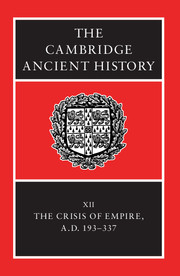Book contents
- Frontmatter
- PART I NARRATIVE
- PART II GOVERNMENT AND ADMINISTRATION
- 5 The army
- 6 The emperor and his administration
- 7a High classical law
- 7b Epiclassical law
- PART III THE PROVINCES
- PART IV THE ECONOMY OF THE EMPIRE
- PART V THE NON-ROMAN WORLD
- PART VI RELIGION, CULTURE AND SOCIETY
- Chronology
- Bibliography
- Index
- Topographical map of the Roman empire
- Map 2 The Roman empire in a.d. 211
- The Roman empire in a.d. 314
- The Rhine–Danube limes in the late second century
- References
5 - The army
from PART II - GOVERNMENT AND ADMINISTRATION
Published online by Cambridge University Press: 28 March 2008
- Frontmatter
- PART I NARRATIVE
- PART II GOVERNMENT AND ADMINISTRATION
- 5 The army
- 6 The emperor and his administration
- 7a High classical law
- 7b Epiclassical law
- PART III THE PROVINCES
- PART IV THE ECONOMY OF THE EMPIRE
- PART V THE NON-ROMAN WORLD
- PART VI RELIGION, CULTURE AND SOCIETY
- Chronology
- Bibliography
- Index
- Topographical map of the Roman empire
- Map 2 The Roman empire in a.d. 211
- The Roman empire in a.d. 314
- The Rhine–Danube limes in the late second century
- References
Summary
CHANGE AND CONTINUITY
When Maximinus (235–8) erected in front of the senate house a picture showing his personal bravery on campaign, it was a striking indication that the Roman emperor might now fight in the battle line. Unfortunately the advice given to Severus Alexander by his mother, that it was the responsibility of other people to take risks for him, was no longer entirely valid. Augustus, after campaigning in Spain (26–5 b.c.), shrewdly removed himself from the conduct of military operations; the risks and the responsibility for failure could be delegated to others while he monopolized all the glory. However, from the time of Domitian, emperors increasingly took personal charge of campaigns and so became more closely associated with their soldiers, and more directly responsible for military success or failure. By the time of Maximinus it had long been accepted that the emperor would direct all major campaigns, though Maximinus' personal intervention in battle added a new dimension. This close identification between the emperor and his military duties encouraged the belief that to be an effective emperor a man needed to be an effective leader in war. Moreover, there were in the third century more threats to the emperor's personal security, and at the same time his wider military duties were more pressing; the army, pampered and repeatedly bribed, was more difficult to control and had an enhanced importance in imperial affairs, usurpers were increasingly ready to try their luck, and the strategical outlook for the empire was worsening. Indeed the disloyalty of army commanders in this period and the feeble ineffectiveness of many ephemeral emperors, drawn in the main from the senatorial class, may have raised doubts about the competence and suitability of senators in top military posts.
- Type
- Chapter
- Information
- The Cambridge Ancient History , pp. 110 - 130Publisher: Cambridge University PressPrint publication year: 2005
References
- 3
- Cited by

